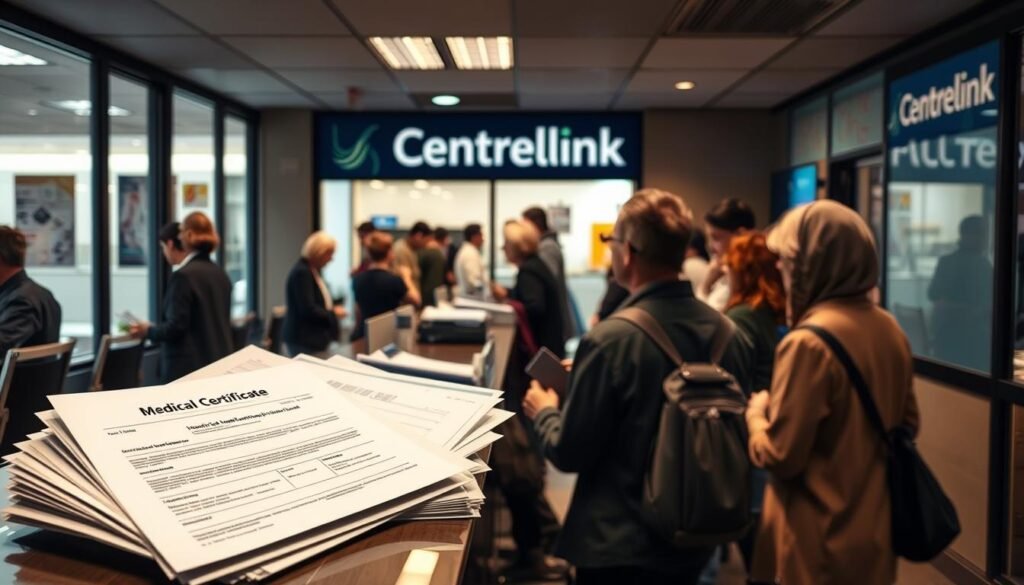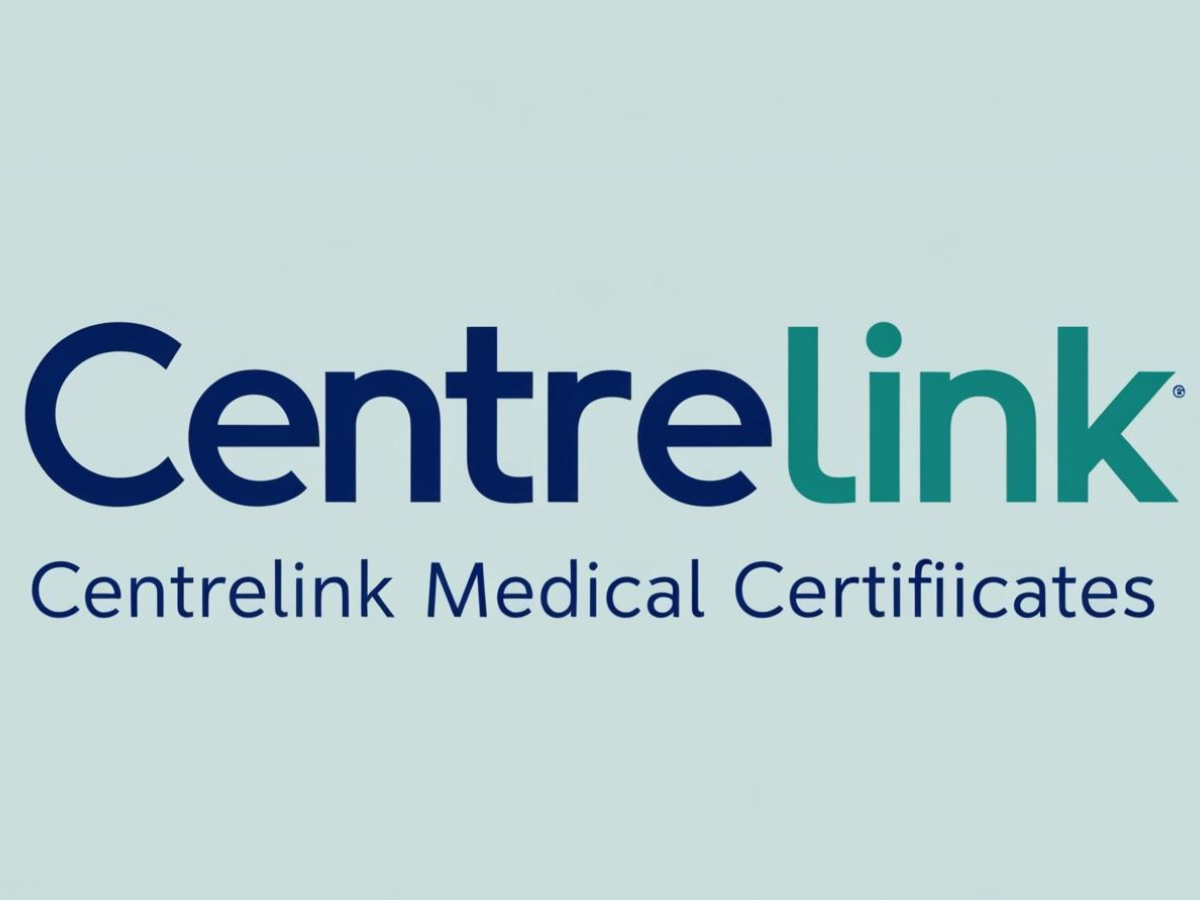From January 1, 2025, Australians will see a big change in Centrelink medical certificates. The maximum exemption period will jump from 13 weeks to 24 months. This change by Services Australia will affect many income support programs.
These programs include Jobseeker, Youth Allowance, Parenting Payment Single, and Special Benefits for Nominated Visa Holders. The new rule aims to help those facing health issues find jobs. Job seekers will now get up to 24 months of medical exemption, a big jump from the old 13-week limit.
Major Highlights
- Centrelink medical certificate exemption period extended from 13 weeks to 24 months
- Policy change affects major income support programs like Jobseeker, Youth Allowance, and Parenting Payment Single
- Job seekers now eligible for up to 24 months of medical exemption
- Aim is to provide more flexible and compassionate support for Australians facing health-related employment barriers
- Increases in payment rates for various JobSeeker recipient categories
the New Medical Certificate Extension Policy
The Australian government has made big changes to the medical certificate policy for Centrelink. From January 1, 2025, the maximum time off for health reasons will go from 13 weeks to 24 months. This is for those who show they are sick with doctor’s notes for centrelink or centrelink illness evidence.
This change will help people on JobSeeker, Youth Allowance for job seekers, Parenting Payment Single (when the youngest child turns 6), and Special Benefits for Nominated Visa Holders. It lets them focus on getting better without worrying about finding a job right away.
Implementation Timeline
The new policy starts on January 1, 2025. It gives people more time to deal with their health before they have to look for work again.
Duration and Scope of Changes
The time off for health reasons has been doubled to 24 months. This gives people plenty of time to get better and find a job again. It shows the government cares about the health and wellbeing of those on income support.
Affected Payment Types
The policy change affects these Centrelink payments:
- JobSeeker
- Youth Allowance for job seekers
- Parenting Payment Single (when the youngest child turns 6)
- Special Benefits for Nominated Visa Holders
This change aims to make life easier for people dealing with health issues while on income support. It’s a more flexible and caring approach.
| Payment Type | Previous Exemption Period | New Exemption Period |
|---|---|---|
| JobSeeker | 13 weeks | 24 months |
| Youth Allowance (job seekers) | 13 weeks | 24 months |
| Parenting Payment Single (child aged 6+) | 13 weeks | 24 months |
| Special Benefits for Nominated Visa Holders | 13 weeks | 24 months |
This shows the government’s dedication to supporting Centrelink recipients with health issues. It lets them focus on getting better without the stress of job hunting.
You can also read
Impact on Income Support Recipients and Payment Requirements
The new policy from Centrelink has a big impact on those getting income support in Australia. It gives more flexibility to those who are sick or have ongoing health issues. This lets them focus on getting better without the stress of finding a job right away.
Even with more flexibility, those getting income support must agree to a Job Plan. They need to attend meetings and look for work when they can. This policy aims to help those with health problems while also making sure they’re trying to find jobs.
Recently, the rates for social security payments have gone up. For example, the JobSeeker payment for single people over 22 with no kids now is $778 every two weeks. This increase helps those who are struggling financially and provides a safety net.
| Payment Type | Maximum Rate (Fortnightly) |
|---|---|
| JobSeeker Payment (Single, no children) | $778 |
| Disability Support Pension | $900.80 |
| Aged Pension | $900.80 |
The new rules on Centrelink medical exemptions and medical certificate guidelines help income support recipients get the help they need. They also make sure these people can balance their health needs with job obligations. This shows a caring and fair approach to social security for those facing health challenges.

Centrelink Medical Certificates: Documentation and Assessment Process
When you apply for Centrelink financial help, you might need to give medical certificates. These certificates are key in the Centrelink process. They show your health issues, how long they’ll last, and any work limits. Knowing how to get and send these certificates is important for Centrelink users.
Required Medical Evidence
The medical certificate for Centrelink must have all the important details. This includes:
- A clear description of the medical condition or disability
- The expected duration of the condition and its impact on the person’s ability to work
- Any work limitations or restrictions imposed by the condition
Exemption Assessment Criteria
Centrelink looks at each exemption or reduction request carefully. They consider the condition’s severity and how long it will last. They also look at how it affects your work ability. The factors they check are:
- The nature and severity of the condition
- The projected timeline for recovery or improvement
- The impact on the person’s ability to engage in work-related activities
Processing Timeframes
Centrelink tries to handle medical certificate submissions and claims quickly. Right now, it takes about 84 days to process these claims. But, Services Australia is working to get better and make things faster for everyone.
| Statistic | Value |
|---|---|
| Work-related injuries and illnesses in Australia | Cost $28.6 billion annually |
| Injured workers initially deemed unfit-for-work | More than 70% |
| GPs less likely to provide fit-for-work certificates for mental health claims | Yes |
By knowing what centrelink health documentation and centrelink medical certificates need, you can give the right info. This helps your Centrelink claim and increases your chances of getting help.
“Careful evaluation before issuing medical certificates is essential to prevent fraudulent claims and ensure accurate representation of the patient’s condition.”
Changes to Mutual Obligation Requirements
The Albanese government is making big changes to help those on centrelink sick leave and centrelink medical exemptions. These updates aim to make things easier for people getting income assistance. They want to reduce the hassle and stop payments from being suspended unfairly.
One major change is the longer grace period for missed appointments. Now, job seekers have five days to get in touch with their employment services provider. This is up from 48 hours before. It’s hoped this will cut down on about 1 million payment suspensions each year.
Also, the government is protecting job seekers who work over 30 hours a fortnight. They won’t face payment suspensions for missing appointments anymore. This change is meant to offer more support and flexibility for those working and getting government help.
